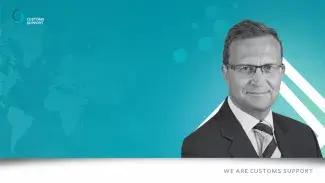In this edition, we are excited to present Ian Featherstone, who joined Customs Support in December as our new CDO.
Join us as Ian shares his experience and insights in this article.
Who are you?
I’m Ian Featherstone, 55 years old. I live in Bristol, which is in the UK, and I have a daughter who is now 27 years old.
My work for the last 15 years has been to deliver digital transformation programs for private equity companies. In December, I joined Customs Support as the CDO so that I can accelerate the digital programme at CSG.
What does the CDO do at Customs Support?
Customs Support is a digital-first customs company, and that means a lot more than just automating some customs processes and getting rid of paper.
What we are going to do is digitalise every business process and every customer journey. We are transforming from an admin-based company to a technology-based company. That is what I am here to help deliver.
Alongside that, my remit covers the traditional support for our laptops, servers, printers, photocopiers – basically anything that has a power supply.
What does your typical working day look like?
I work in the UK, but our headquarters is in Rotterdam and the rest of my international colleagues are ahead of us, so I start early because of the time difference.
Nearly every morning at 07:30, I am in meetings with the team to make sure we are up to speed, on top of any issues, and know what we are going to achieve that day. Thankfully, most people speak good English, so we keep up communication throughout the day without too many language issues.
I travel to a Customs Support office, a supplier, or a customer most weeks, but I prefer to work from home when possible. Travel takes up a lot of time, so I don’t do it just for the sake of it.
You’ve delivered many digital transformations over the last 15 years. What attracts you to this type of project?
I like being empowered to get on and do my job, as well as the fast-paced culture that you see with private equity backing. There is less bureaucracy and red tape – you simply get hired to perform and given the freedom you need to do it.
You can find an almost entrepreneurial aspect in that environment, and that is both what you need to succeed and what I like about this type of role – I get to make a difference.
This is the first customs company you’ve done this for. What attracted you to Customs Support?
I have worked with many companies who have one or two European division before; I haven’t worked with a company that is working with 14. Working with different cultures, languages, and ways of working is both something I enjoy and also a challenge. A Europe-wide project appeals to me.
Furthermore, I feel like Customs Support is the place where I can use my skills to the fullest. Our digitalisation and data integration solutions are not just cutting-edge, they are bleeding edge, setting a new standard in the customs industry.
So far, we are a significant step ahead of any competition, not only in terms of our operational level of digitalisation and connectivity but also in our solutions for data interchange, enrichment, reporting, and analysis, multiplied by our market coverage across Europe. We are investing massively in new technology and talent to elevate CustomsTech to the next level.
What is the next stage of digital development for Customs Support?
This year, we are aiming to digitalise approximately half of our declarations across the group. We are running at almost double that in some countries, whereas other countries could be still behind.
In this respect, we are bringing some of our more recent acquisitions up to scratch with the rest of the group. As they begin to adopt our newer technologies and integrations, we will really propel ourselves forward.
We already provide next-level digital solutions to our clients, but there is so much more we can do.
Our ultimate goal is to fully digitalise and automate our customers' business processes by integrating our operational systems and enabling seamless two-way communication and data enrichment. We plan to implement new Intelligent Document Processing tools soon and further enhance this journey with customized AI solutions and machine learning in the future.
How do you feel our digital focus helps us to deliver better quality to our clients?
Accuracy is essential when it comes to customs, but so is speed. With digitalisation, we don’t need to choose one or the other – we can deliver both.
What’s more, we can free up our declarants’ time by taking away some of their need to input manual data. This means that they can focus on using their knowledge and experience where it counts most and can do this for a larger volume of critical tasks.
Where we deliver the real value to clients is not only in reducing border clearance time – it’s in the overall visibility, connectivity, and efficiency that we can create in their supply chain management and decision-making processes.
Imagine warehouse management, ERP, and other supply chain software all singing off the same hymn sheet – able to reconcile automatically and provide you with up to date, accurate information throughout, including live Track & Trace events on customs release and exception. This is what we are able to deliver at Customs Support, both inside our customers’ systems or and with the My Customs Support platform.
Overall, we deliver greater efficiency and value simply because we can do more with the same resources and empower our customers to do the same – without compromising on quality.
What do you like to do when you're not at work, and how do you think that influences your work skills?
I am a Liverpool FC supporter and have always loved playing football as well. I also qualified as a chef many years ago and enjoy cooking when I am not out eating at restaurants.
My wife and I also do many fitness challenges for a motor neuron disease charity and are in training for a 100-kilometre walk – which will be completed over two days in September. It’s a cause that’s close to us, and we like to challenge ourselves because we are lucky enough to be able to.
I think it is important that we have a varied life outside of work because we can better connect with people inside work that way. We can be more empathetic to the challenges they can face and better help them when they need it. It’s important for us to work well together, and that means understanding each other’s strengths, weaknesses, and reasons.
You work for a Europe-wide network. If you could visit an office location of Customs Support, which country would you go to first and why?
I’ve been to a 10 of them already. I really like the architecture in Antwerp and Ghent is a beautiful town.
To pick where I would like to go next, it would have to be a sunny one, so I would say Spain or Poland – but I am pressuring the M&A team to look at acquisitions in Dubai and Barbados…














